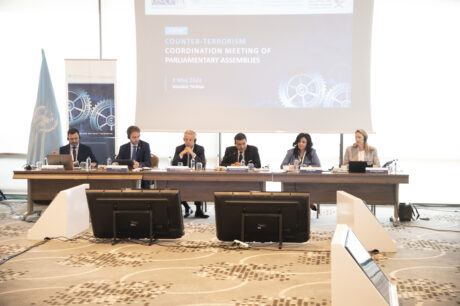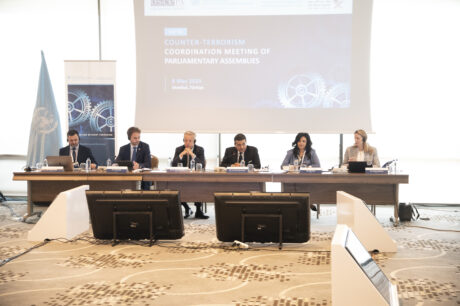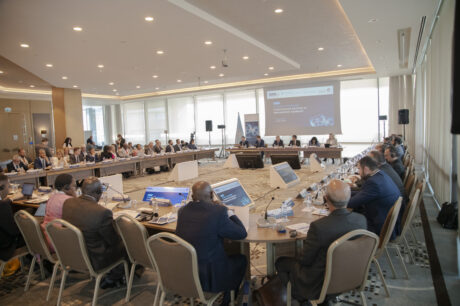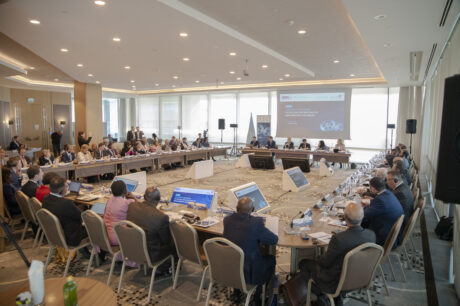Third Parliamentary Policy Dialogue on the Protection of Religious Sites, Symbols and Objects Against Terrorist Threats
Reposted from UNOCT: www.un.org/counterterrorism/
Istanbul, Türkiye, 9 May 2024 – The Third Parliamentary Policy Dialogue concluded today under the theme “Protecting Religious Sites, Symbols and Objects against Terrorist Threats.” It was co-organized by the United Nations Office of Counter-Terrorism (UNOCT) through its Programme Office on Parliamentary Engagement in Preventing and Countering Terrorism and the Global Programme on Countering Terrorist Threats against Vulnerable Targets, with the support of the Shura Council of the State of Qatar, and in partnership with the Organization for Security and Co-operation in Europe Parliamentary Assembly (OSCE PA).
This hybrid meeting gathered around 80 in-person and 30 online representatives of Parliamentary Assemblies, National Parliaments from Africa, Asia, Europe, and Latin America, as well as the United Nations Global Network of Experts on Vulnerable Targets Protection. At the opening session, Mr. Ignacio Ibanez, Head of the UNOCT Programme Office in Madrid and Coordinator of the United Nations Global Programme on Countering Terrorist Threats against Vulnerable Targets, stressed that “safeguarding religious sites, symbols and objects requires a concerted effort involving all stakeholders: governments, civil society organizations, academia, the private sector, and international and regional bodies.”
In her keynote speech, Ms. Nihal Saad, Director of the United Nations Alliance of Civilizations (UNAOC), said “Protection of religious sites is addressed by Member States through a variety of normative frameworks and policy instruments including national security strategies and national legislations.” She added “Although Members of Parliament and religious leaders have different mandates, they share the common goal of serving their communities and promoting their well-being. Their collaboration is crucial so that appropriate measures and adequate approaches are taken to ensure the safety of worshippers.”
Experts from New Zealand, Spain, the United States, the African Centre for the Study and Research on Terrorism (ACSRT), OSCE, the Commonwealth of Independent States (CIS), UNAOC and UNOCT participated in the three sessions of the Dialogue.
Over the past years, terrorists have repeatedly attacked religious sites and places of worship around the world seeking to strike at the very core of communities’ sense of identity and belonging. Perpetrators of attacks conducted during religious holidays or celebrations also seek to have a stronger symbolic and human impact due to the higher number of congregants – and thus potential victims – being present. The United Nations has firmly denounced both the terrorist attacks against religious sites and the desecration of holy texts and symbols.
The Third Parliamentary Policy Dialogue provided a forum to raise awareness on the increasing terrorist threat against religious sites, congregants, religious texts, symbols, and objects by engaging parliamentarians and representatives of parliamentary assemblies in a structured discussions on the legislative and regulatory challenges, as well as institutional gaps and operational loopholes in protecting these vulnerable targets. Participants shared experiences on existing legislative practices to protect religious sites and symbols and discussed areas of potential collaboration between parliamentary assemblies, parliamentarians, the United Nations, and other relevant international organizations in this regard.
Some of the key conclusions and recommendations of the Dialogue included the need to address, through appropriate risk and threat assessments, the increasing terrorist attacks against religious sites and recent trends such as the exploitation of local grievances and the rise in misinformation, disinformation and hate speech, as well as intercommunal tensions. Participants also highlighted the importance of regional particularities in identifying threats and developing responses; the need to strengthen physical security measures to protect religious sites, while also enhancing PCVE measures, especially amongst youth and in the education context. There was broad recognition of the critical role of parliamentarians in developing legislation and public-private partnerships with relevant stakeholders; and of community-level engagement to enhance inter- and intra-faith dialogue.
This Third Policy Dialogue follows similar thematic events held in Doha, Qatar and Vienna, Austria in 2023 on border security and cross-border cooperation in the context of counter-terrorism and on youth and the prevention of violent extremism. The next Policy Dialogue is tentatively planned to take place in December 2024 in Doha, State of Qatar and will focus on the threats of use of Artificial Intelligence and New Technologies for terrorist and extremist purposes.
For more information: Contact Gerardl@un.org, Public Information Officer, UNOCT




